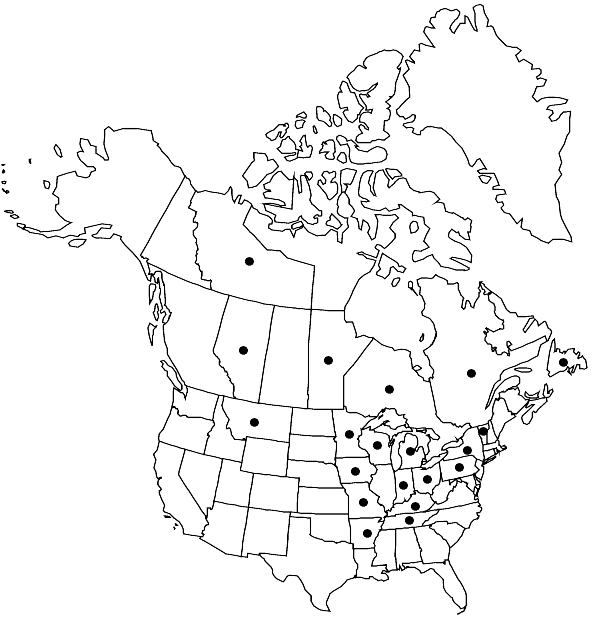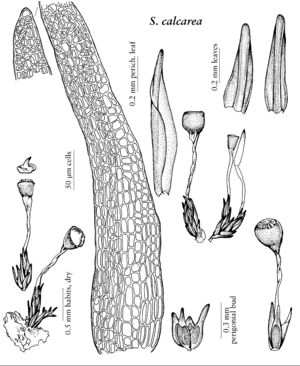Difference between revisions of "Seligeria calcarea"
Bryol. Europ. 2: 10. 110. 1846,.
FNA>Volume Importer |
FNA>Volume Importer |
||
| Line 23: | Line 23: | ||
|habitat=Calcareous substrates | |habitat=Calcareous substrates | ||
|distribution=Alta.;Man.;Nfld. and Labr. (Nfld.);N.W.T.;Ont.;Que.;Ark.;Ind.;Iowa;Ky.;Mich.;Minn.;Mo.;Mont.;N.Y.;Ohio;Pa.;Tenn.;Vt.;Wis.;Europe. | |distribution=Alta.;Man.;Nfld. and Labr. (Nfld.);N.W.T.;Ont.;Que.;Ark.;Ind.;Iowa;Ky.;Mich.;Minn.;Mo.;Mont.;N.Y.;Ohio;Pa.;Tenn.;Vt.;Wis.;Europe. | ||
| − | |discussion=<p>Seligeria calcarea is relatively common in eastern North America from Newfoundland south to Arkansas, and known from a few stations in western Canada and Montana. While its long, stoutly subulate leaves are quite similar to those of S. donniana, the leaf margins of S. calcarea are entire and those of S. donniana are denticulate. The sporophytes of S. calcarea are generally distinctive: the capsules gradually contract to the seta though a shriveled neck, a well-developed peristome is present, and the length of the capsule equals or slightly exceeds the width. Seligeria calcarea is distinguished from S. pusilla in having a subula filled by an expanded costa, whereas the latter has a slender costa ending in the apex.</p> | + | |discussion=<p><i>Seligeria calcarea</i> is relatively common in eastern North America from Newfoundland south to Arkansas, and known from a few stations in western Canada and Montana. While its long, stoutly subulate leaves are quite similar to those of <i>S. donniana</i>, the leaf margins of <i>S. calcarea</i> are entire and those of <i>S. donniana</i> are denticulate. The sporophytes of <i>S. calcarea</i> are generally distinctive: the capsules gradually contract to the seta though a shriveled neck, a well-developed peristome is present, and the length of the capsule equals or slightly exceeds the width. <i>Seligeria calcarea</i> is distinguished from <i>S. pusilla</i> in having a subula filled by an expanded costa, whereas the latter has a slender costa ending in the apex.</p> |
|tables= | |tables= | ||
|references= | |references= | ||
| Line 45: | Line 45: | ||
|publication year= | |publication year= | ||
|special status= | |special status= | ||
| − | |source xml=https://jpend@bitbucket.org/aafc-mbb/fna-data-curation.git/src/ | + | |source xml=https://jpend@bitbucket.org/aafc-mbb/fna-data-curation.git/src/8f726806613d60c220dc4493de13607dd3150896/coarse_grained_fna_xml/V27/V27_441.xml |
|genus=Seligeria | |genus=Seligeria | ||
|species=Seligeria calcarea | |species=Seligeria calcarea | ||
Revision as of 17:55, 18 September 2019
Plants tiny, olive green. Leaves linear-lanceolate to ovate-lanceolate, stoutly subulate from oblong-ovate base, narrowly obtuse; costae ending in apex, filling subula; margins entire; leaf cells (1–)2:1; perichaetial leaves somewhat larger but similar to vegetative leaves, not much differentiated. Seta 1–1.5 mm, straight. Capsule ovate to hemispheric, as wide as long, widest at mouth only when old; peristome of 16 well-developed teeth; columella immersed. Spores 14–16 µm.
Habitat: Calcareous substrates
Distribution

Alta., Man., Nfld. and Labr. (Nfld.), N.W.T., Ont., Que., Ark., Ind., Iowa, Ky., Mich., Minn., Mo., Mont., N.Y., Ohio, Pa., Tenn., Vt., Wis., Europe.
Discussion
Seligeria calcarea is relatively common in eastern North America from Newfoundland south to Arkansas, and known from a few stations in western Canada and Montana. While its long, stoutly subulate leaves are quite similar to those of S. donniana, the leaf margins of S. calcarea are entire and those of S. donniana are denticulate. The sporophytes of S. calcarea are generally distinctive: the capsules gradually contract to the seta though a shriveled neck, a well-developed peristome is present, and the length of the capsule equals or slightly exceeds the width. Seligeria calcarea is distinguished from S. pusilla in having a subula filled by an expanded costa, whereas the latter has a slender costa ending in the apex.
Selected References
None.
